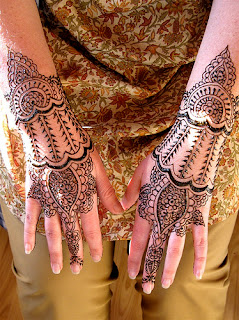Henna Bridal Designs:
Bridal henna traditions originated in the late Neolithic fertility religions in the eastern Mediterranean, and spread from there to many countries from the east coast of Africa to Malaysia and Fiji, South Africa from the north to Armenia. Bridal henna in the same way by Muslims, Christians, Jews, Roma, Zoroastrians, Sikhs and Hindus in the countries where henna is available enough to be a tradition.
South Asian weddings the "Mehndi Night" is an important pre-wedding function, attended by all women relations and friends of the bride. Men are generally not part of this event. In many cultures the groom's family sends the henna (specially prepared and beautifully wrapped) to the bride before the wedding.
It is believed that the deeper the color of Mehndi on the hands of the bride, the stronger the love between husband and wife. Some believe that a dark color means that they will be much loved by her mother-in-law, while others say it's a good sign indicating the new family favorite.
It is customary that the bride is not allowed to do housework while the bridal henna pattern has not faded. This was perhaps a way to get an extended honeymoon for the couple.
Bridal henna traditions originated in the late Neolithic fertility religions in the eastern Mediterranean, and spread from there to many countries from the east coast of Africa to Malaysia and Fiji, South Africa from the north to Armenia. Bridal henna in the same way by Muslims, Christians, Jews, Roma, Zoroastrians, Sikhs and Hindus in the countries where henna is available enough to be a tradition.
South Asian weddings the "Mehndi Night" is an important pre-wedding function, attended by all women relations and friends of the bride. Men are generally not part of this event. In many cultures the groom's family sends the henna (specially prepared and beautifully wrapped) to the bride before the wedding.
It is believed that the deeper the color of Mehndi on the hands of the bride, the stronger the love between husband and wife. Some believe that a dark color means that they will be much loved by her mother-in-law, while others say it's a good sign indicating the new family favorite.
It is customary that the bride is not allowed to do housework while the bridal henna pattern has not faded. This was perhaps a way to get an extended honeymoon for the couple.
 02:53
02:53
 Interior Design
Interior Design
























 Posted in:
Posted in: 








0 comments:
Post a Comment